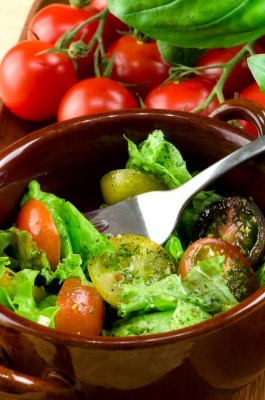Potassium
Potassium is a vital, but widely misunderstood nutrient. This is partly because recommended intake of potassium is remarkably high, not because of the potassium itself, but because of the health benefits of the potassium containing foods. Potassium deficiency (hypokalemia) is rare in healthy people, even athletes who train in hot environments. However, care must be taken when training after illnesses that cause vomiting or diarrhea.
Contents
1 What is potassium?
Potassium and sodium of the two major positive electrolytes, with potassium concentrated inside our cells and sodium concentrated on the outside. The primary negative electrolyte is chloride, along with some bicarbonate (HCO3) that maintains the pH level (acidity).
2 Where do we get potassium from?
Potassium is an abundant nutrient in most fruit and vegetable. Most of this potassium is in the form of potassium bicarbonate, not potassium chloride. This is important, as the bicarbonate has a number of health benefits, including regulating the blood acidity. If there is not sufficient bicarbonate, calcium will be leached from the bones to maintain the correct acidity level. The fruit and veg that contain potassium also typically contain other nutrients including Fiber.
3 How much potassium is recommended?
For adults the recommended daily intake of potassium is 4700 mg, but this is not set to prevent potassium deficiency (hypokalemia). Instead, "this level of dietary intake (i.e., from foods) should maintain lower blood pressure levels, reduce the adverse effects of sodium chloride intake on blood pressure, reduce the risk of recurrent kidney stones, and possibly decrease bone loss[1]." These benefits are largely from the bicarbonate and the other vegetable matter rather than from the potassium.
3.1 Magnesium Deficiency
Subjects who are deficient in both Potassium and Magnesium who are given just potassium supplements have normalized serum potassium levels, but not normalized muscle potassium until magnesium supplementation is also givenCite error: Closing </ref> missing for <ref> tag
[2]
[3]
[4]
[1]
[5]
[6]
[7]
- ↑ 1.0 1.1 Accessed on 25 August 2013
- ↑ Hypokalemia: MedlinePlus Medical Encyclopedia, http://www.nlm.nih.gov/medlineplus/ency/article/000479.htm, Accessed on 25 August 2013
- ↑ A. Sebastian, E. McSherry, RC. Morris, Renal potassium wasting in renal tubular acidosis (RTA): its occurrence in types 1 and 2 RTA despite sustained correction of systemic acidosis., J Clin Invest, volume 50, issue 3, pages 667-78, Mar 1971, doi 10.1172/JCI106537, PMID 5101785
- ↑ CF. CONSOLAZIO, LO. MATOUSH, RA. NELSON, RS. HARDING, JE. CANHAM, Excretion of sodium, potassium, magnesium and iron in human sweat and the relation of each to balance and requirements., J Nutr, volume 79, pages 407-15, Apr 1963, PMID 14022653
- ↑ G. Norbiato, M. Bevilacqua, R. Meroni, U. Raggi, R. Dagani, D. Scorza, G. Frigeni, T. Vago, Effects of potassium supplementation on insulin binding and insulin action in human obesity: protein-modified fast and refeeding., Eur J Clin Invest, volume 14, issue 6, pages 414-9, Dec 1984, PMID 6441716
- ↑ R. Whang, L. G. Welt, Observations In Experimental Magnesium Depletion*, Journal of Clinical Investigation, volume 42, issue 3, 1963, pages 305–313, ISSN 0021-9738, doi 10.1172/JCI104717
- ↑ T. Dyckner, PO. Wester, Ventricular extrasystoles and intracellular electrolytes in hypokalemic patients before and after correction of the hypokalemia., Acta Med Scand, volume 204, issue 5, pages 375-9, 1978, PMID 82374
- Category:Pages with reference errors
